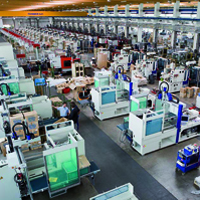The beating heart of the company‘s production is in the Franconian village of Dietenhofen in the district of Ansbach. 1,200 employees work here. Every day, 443 injection moulding machines spray up to 10 million individual components, 250,000 pieces are pressed and an average of 65,000 PLAYMOBIL sets are packaged. In 2011, geobra dispatched a record number of 55 million finished items. To achieve these impressive production figures, shift workers operate the moulding machines around the clock. The seven spraying halls are equipped with first-class machines from Arburg, Babyplast, Battenfeld, Boy, Ferromatik, Sumitomo Demag, Engel and Krauss Maffei. Even the smallest pieces of equipment have a clamping force of six tons; the biggest have a force of between 250 and 2,000 tons. Soon even larger machines used by Brandstätter to make high-quality planters bearing the brand name LECHUZA will become operational.
The hydraulics systems in the modern injection moulding machines are compact and particularly high-performance. Reduced gap tolerances and improved quality of surfaces enable extremely high working pressures with high clamping force and incredibly precise working system components. In Dietenhofen, a specialist hydraulics department maintains the hydraulic systems of the 443 injection moulding machines. Eight engineers and five electricians carry out routine checks based on the guidelines provided by the individual manufacturers at 500-hour intervals. Additionally, extensive annual maintenance work is carried out after 5,000 operating hours, sometimes more frequently. Depending on their make, the hydraulic systems operate with between 12 and 3,000 litres of hydraulic oils, type HLP 46, in accordance with DIN 51524 T-2. These are predominantly conventional mineral-oil based hydraulic oils with ZnDTP-based additives. Zinc-free HLP 46 is only used if specified by the machine manufacturer. On the whole, geobra keeps the range of lubricants and hydraulic oils it uses to an absolute minimum to avoid mixing up oils, e.g. during additional bypass filtration.

Maintaining and monitoring hydraulic oils is vital to the running of the machines. It is not uncommon for a machine to operate for over 35,000 hours without oil changes. Fresh oil, which does not always meet the required purity levels because it has been transported and stored, only enters the machine after it has passed through an upstream fine filter. Many machines are also equipped with a bypass filter. The hydraulic oils in machines which use very large quantities of oil undergo bypass filtration through supplementary filters. The inspection of used oils to check for mixing or pollution is carried out according to the manufacturer specifications and includes on-site testing and OELCHECK analyses.
Before each major hydraulic oil change, standard procedure is to carry out a large-scale analysis of the oil in the OELCHECK laboratory. Only by doing this can the need to change the oil be confirmed. Among other things, the process closely examines oil ageing. High temperatures, long service lives, high pressure and in some cases even wear particles all accelerate the inevitable ageing process. If the hydraulic oil is not performing at a satisfactory level and the oil‘s viscosity has changed as well, this will have a direct effect on the efficiency of the pump first and foremost. The build-up of pressure required to operate the injection moulding machine is no longer present and the tendency for cavitation of the oil increases. The air output capability deteriorates. The hydraulic fluid must then be changed.
Early damage detection is a further invaluable benefit of the analysis. If, for instance, the laboratory report shows increased levels of the wear metals iron, chromium, tin, copper or lead, targeted action can find the components from which the metals originate. Of course, the oils are also analysed for possible cool water leakage because too much water in oil can damage the pumps. With OELCHECK analyses, geobra can rest assured that there will be no delays to production and no children will be deprived of their beloved PLAYMOBIL figures.
related links
